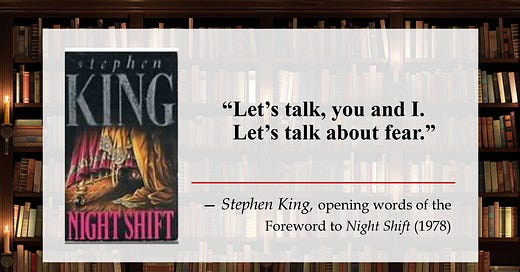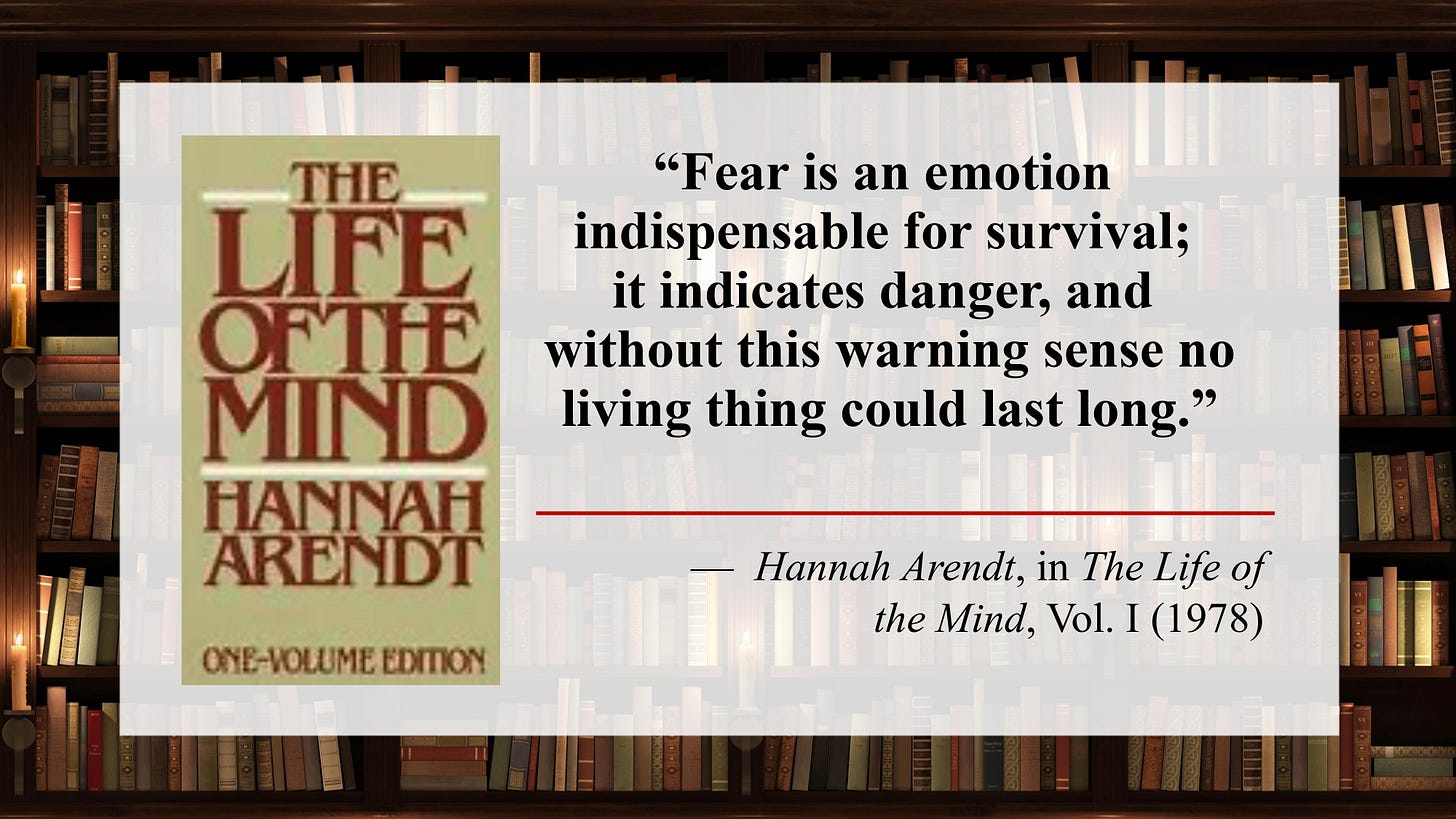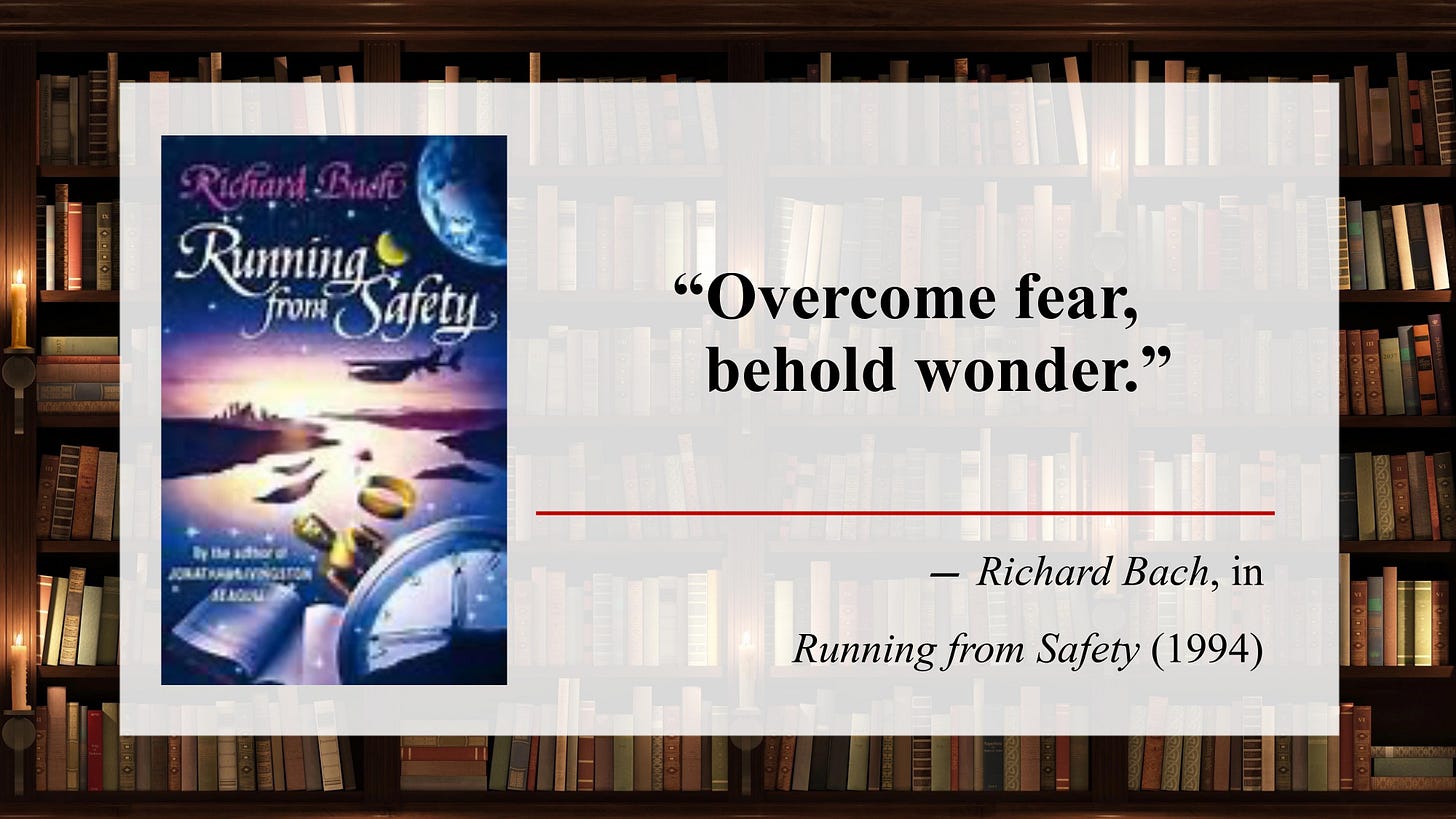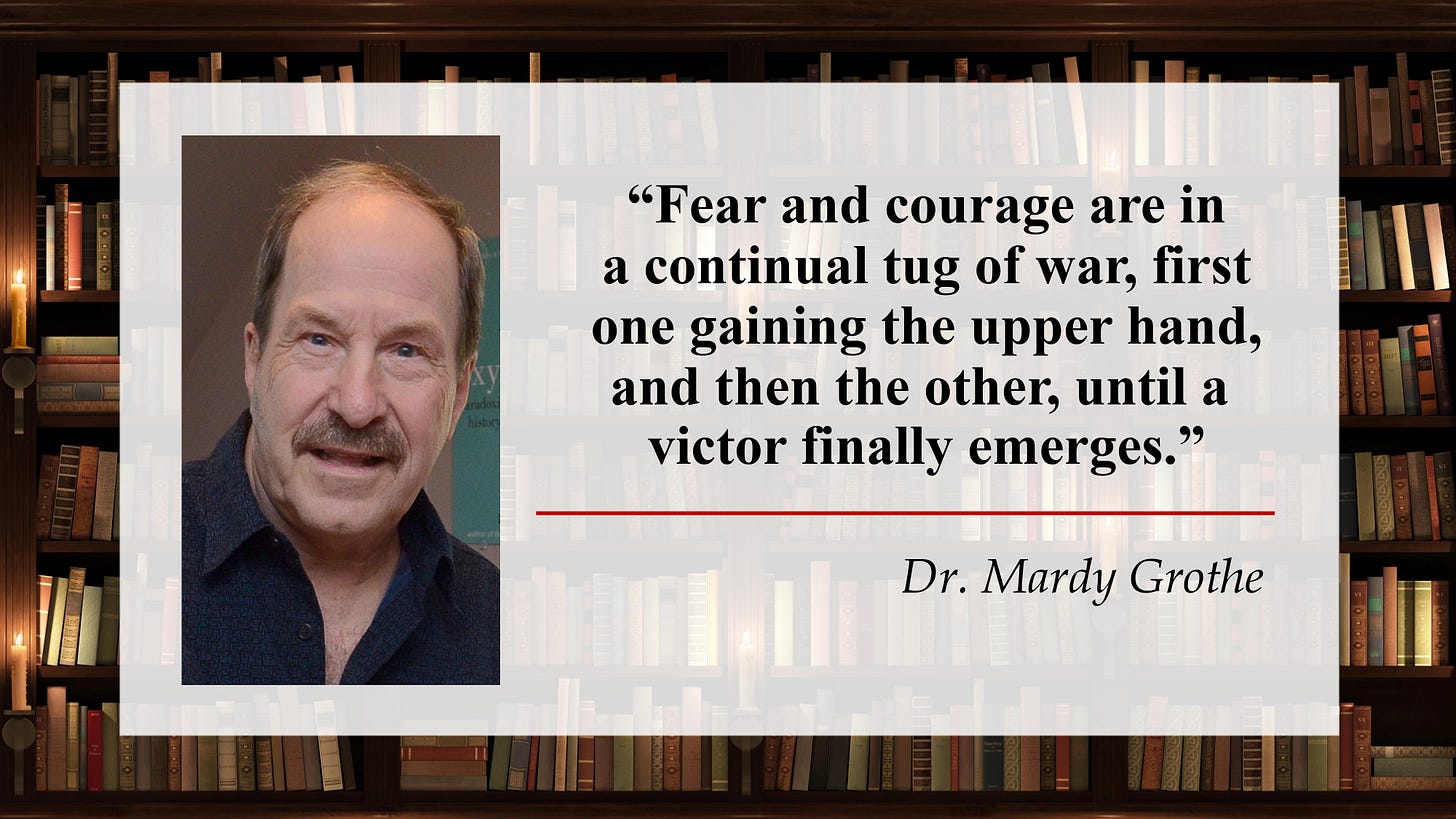Dr. Mardy's Quotes of the Week ("Overcoming Fear")
August 4—10, 2024 | THIS WEEK'S THEME: “Overcoming Fear"
Opening Line of the Week
These are the opening words of the Foreword to Night Shift, King’s first collection of short stories. A little more than two decades later, fellow horror writer Peter Straub wrote about these two brief sentences:
“With its deliberate repetition of the first two words, its gliding but insistent rhythm, and its movement from the colloquial contraction of ‘let’s’ to the abrupt shock of the final noun, this flourish is literary to the core.”
Straub added, however, that King’s opening words did not come across as literary “because they represent that friendliest of all communications, the invitation.“
For nearly 2,000 memorable opening lines from every genre of world literature, go to www.GreatOpeningLines.com.
This Week’s Puzzler
On August 8, 1896, this woman was born in Washington, DC. Raised in comfortable circumstances in the neighborhood around the Catholic University of America, she was an avid early reader and writer, submitting stories to local newspapers when she was in elementary school. After majoring in English at the University of Wisconsin, she married her college sweetheart, and both accepted jobs at the Louisville Courier-Journal.
In 1928, she was a 32-year-old journalist when she and her husband used an inheritance from her mother to purchase a 72-acre orange grove near a central Florida hamlet named Cross Creek. At first, she had trouble adjusting to the severe living conditions (heat, mosquitos, snakes, alligators, poison ivy) and the unfamiliar—even strange—customs of her new neighbors, who she referred to as “Florida crackers.”
She soon adjusted to the new setting, however, and began to write about aspects of it in letters to her friend Maxwell Perkins, a New York editor who was well on his way to becoming a living legend. He encouraged her to turn the letters into novels and short stories, and her Cross Creek writings ultimately established her reputation in the literary world.
Today, she is best remembered for The Yearling (1938), an endearing story about Jody Baxter, a backwoods Florida boy who adopts a young fawn. The book was the bestselling American novel of the year, topping the The New York Times bestseller list for twenty-three consecutive weeks.
Awarded the Pulitzer Prize for fiction in 1939, the novel was adapted into a popular 1946 film starring Gregory Peck and Jane Wyman as the boy’s parents. After a nationwide search, Claude Jarman, Jr., an unknown fifth-grader from Nashville was cast as Jody, and he went on to receive a special Academy Award as the outstanding child actor of 1946 (the last I heard, Jarman was still living—at age 89—in his hometown of Nashville).
In her writings, this Week’s Mystery Woman offered quotable observations on numerous topics. In her 1942 memoir Cross Creek, for example, she wrote:
Who is this person? (Answer below)
Have You Ever Overcome a Great Fear?
The role of fear in human life is an immense—and immensely interesting—subject. I’ll try to make the topic more manageable this week by focusing on one specific aspect: overcoming fear. But first, a few thoughts about the broader topic. The American Heritage Dictionary defines fear this way: “A very unpleasant or disturbing feeling caused by the presence or imminence of danger.”
The experience of fear is essential because it can save our lives when we’re threatened with danger. At the first sensation of fear, a portion of our brain known as the amygdala (pronunciation guide here) triggers a series of physiological changes designed to help us either do battle against the threat or flee from it (for more on the “fight-flight” response, go here).
The experience of fear goes back so far in evolutionary history that we describe the emotion as “primal.” In human beings, primal emotions are innate, instinctual responses that have evolved over millions of years to help ensure the survival of the species. More than 2,500 years ago, the Greek writer Aeschylus observed:
If fear is such a good thing, then why have so many people written so negatively about it over the centuries? Why, for example, would Edmund Burke write in a 1756 book:
“No passion so effectually robs the mind of all its powers of acting and reasoning as fear.”
Or why would Thomas Carlyle write in an 1840 essay:
“The first duty for a man is still that of subduing Fear. We must get rid of Fear; we cannot act at all till then.”
The answer, in short, is that there are basically two kinds of fear in human life. The first can save our lives. This is the kind of fear Hannah Arendt was thinking about when she wrote in The Life of the Mind (1978):
The second kind of fear, however, can ruin our lives—or, at least, greatly reduce our enjoyment of life. For example, if you experience a major fear reaction when a snarling dog approaches, or you accidentally step on a snake, or a menacing spider drops from out of nowhere and lands on your arm, fear is the appropriate response.
However, if your fear of dogs, snakes, or spiders prevents you from visiting a public park, walking on a grassy lawn, or avoiding the “danger” altogether by never leaving your house, then your fear is exaggerated, irrational, and maladaptive. Fears like these—fears with a severe anticipatory dread associated with them—have been described in a variety of ways over the years, and here are three of the best:
When we allow our fears to control us, our quality of life is greatly diminished. And that, I believe, is the principle reason why overcoming fear is such an emotionally rewarding experience. Throughout history, when people have decided to face a great fear directly rather that cower or shrivel before it, they’ve created memories that last a lifetime.
That was certainly the case with this week’s Mystery Woman. Shortly after arriving at her new home in Cross Creek, Georgia, her almost paralyzing fear of snakes became a major stumbling block when she discovered that her new home was infested with all manner of snakes, including rattlesnakes and water moccasins.
At the time, she was in the middle of writing an article on Ross Allen, a young Florida herpetologist, when it occurred to her that he might be of assistance. After asking him to tell her everything he knew about Florida snakes, her curiosity increased to the extent that she eagerly accepted his invitation to join him on an upcoming rattlesnake hunt near the Everglades.
At the beginning of the hunt, she was terrified, and walked so close to Allen that it was almost as if they were glued together. As he continued to share his extensive knowledge about the fascinating creatures they were hunting, however, she noticed that her fears began to rapidly diminish. By the end of the hunt, they had vanished completely, allowing her to use a snake catcher (a wooden pole with an L-shaped metal end) to gather up the rattlers herself. In an understated reference to the experience, she wrote:
“It is difficult to be afraid of anything about which enough is known.”
Forty-five years later, the rationale for her homemade therapeutic approach was provided by psychologist Susan Jeffers, who wrote in her classic book Feel the Fear…and Do It Anyway (1987):
Almost all people have an “overcoming fear” story, and many of them occur during the so-called formative years. For example, in his heavily autobiographical novel Running From Safety (1994), writer Richard Bach recalled a moment from his childhood that forever changed the way he looked at the world. Suffering from a terrifying fear of heights, he summoned his courage one day and climbed to the top of his town’s water tower. Arriving at the final step was thrilling, but the big prize came when he got to his feet, walked around the tower’s platform, and surveyed the vista. About the experience, he wrote:
I had a similar—albeit far less risky—experience when I was in the seventh grade at St. Nicholas Elementary School in Garrison, North Dakota. While I almost always brought home good report cards, I was often chastised by the nuns for my “poor study habits” and lackadaisical attitude.
Shortly after the new school year kicked off, a seventh-grade poetry recital competition was formally announced. The challenge was to recite from memory “Paul Revere’s Ride,” and from the outset we all knew that the odds-on favorites would be the two best students in our class, my friends Jeanne Benshoof and Michael Kirchen. I didn’t even consider signing up for the competition because I didn’t think I had a chance of winning. Then, one day, Sister Angela sat me down and said, “Mardell, if you don’t want to do this for yourself, I understand, but I would like you to do it for me.” Moved by her faith in me, I signed up, but it was not long before I developed a serious case of the jitters.
It was the first time I’d ever experienced a fear that seemed so visceral, and I thought about bowing out a number of times. I somehow managed to stick with it, though, and ultimately recited all fourteen stanzas of Longfellow’s classic poem with nary a slip or a mistake. When Sister Angela awarded me the “First Place” ribbon, she leaned over and whispered in my ear, “I knew you could do it.” It was my very first “overcoming fear” experience, and one I will never forget.
This week, think back to a time in your life when you faced—and overcame—a fear. And if you want to make the assignment more interesting, pose the same question to a close friend or family member. Before doing anything, though, take a few moments to peruse this week/s selection of quotations on the theme:
Life doesn’t mean anything if you can’t rid yourself of fear. — Martha Albrand
Although fear in the right dosage and under the right circumstance protects us…imaginary fear offers straitjackets instead of lifejackets, nooses instead of safety nets. — Regina Barreca
He has not learned the lesson of life who does not every day surmount a fear. — Ralph Waldo Emerson
There are very few monsters who warrant the fear we have of them. — André Gide
I have accepted fear as a part of life…. I have gone ahead despite the pounding in the heart that says: Turn back, turn back; you’ll die if you venture too far. — Erica Jong
Our problem is not to be rid of fear but rather to harness and master it. — Martin Luther King, Jr.
Fear has always been a diminisher of life. — Marya Mannes
You gain strength, courage, and confidence by every experience in which you really stop to look fear in the face. — Eleanor Roosevelt
A man that flies from his fear may find that he has only taken a short cut to meet it. — J. R. R. Tolkien
Courage is resistance to fear, mastery of fear—not absence of fear. — Mark Twain
For more quotations on the theme of FEAR, go here.
Cartoons of the Week:
Answer to This Week’s Puzzler:
Marjorie Kinnan Rawlings (1896-1953)
Dr. Mardy’s Observation of the Week:
Thanks for joining me again this week. See you next Sunday morning, when the theme will be “Tweaking the Golden Rule”
Right now, I have no entries in my Great Opening Lines database that include the phrase golden rule. If you can point me in the direction of any that do, I’d be grateful.
Mardy Grothe
Websites: www.drmardy.com and www.GreatOpeningLines.com
Regarding My Lifelong Love of Quotations: A Personal Note














Thank you for another essay and put life in perspective for me!
"The Yearling" was one of the favorite books of my childhood.
About the Golden Rule: How about the movie "Alfie," in which one line of the title song is, "What would you lend on an old Golden Rule?"